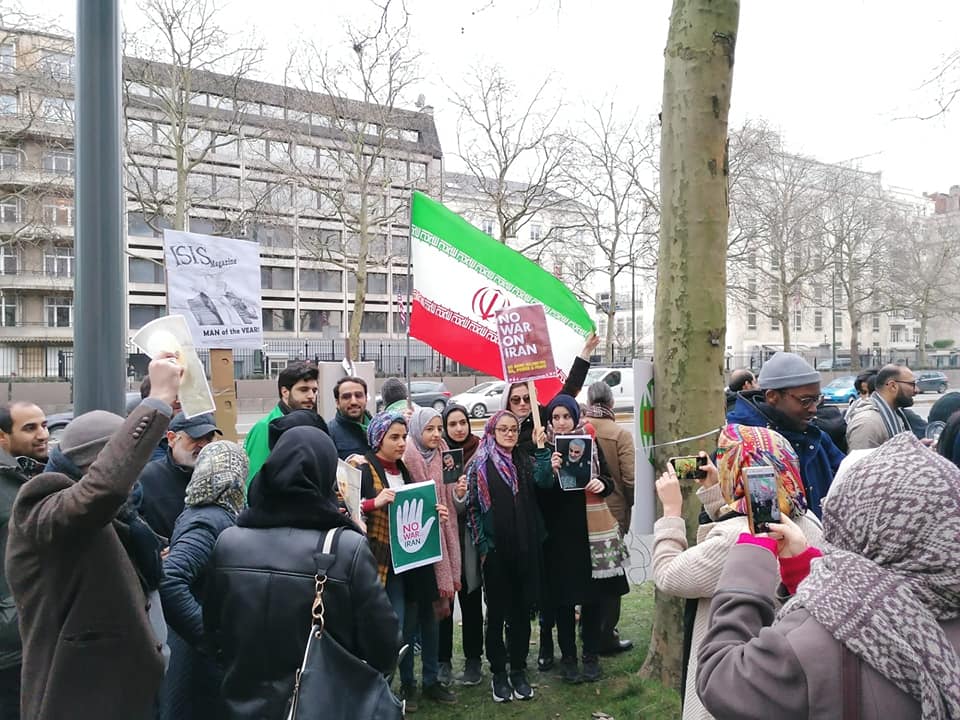Hundreds of demonstrators protested in front of the US Embassy in Brussels at the weekend against the decision to kill a top Iranian official and against further destabilisation of the region.
The group gathered in front of the embassy at around 2:00 PM on Sunday, following a decision by the US government to order an airstrike to kill Iranian General Qassim Suleimani, the country's top military commander.
Suleimani's death sparked outrage and street protests against the US, culminating with the Iraqi parliament voting to expel US troops from the country, where the airstrike took place, also killing Iraqi Commander Abu Mahdi al-Muhandis.
Brandishing signs reading "No Iran war," and "US out of Middle East," the group's protest in Brussels called on European leaders to condemn the killing, which they called an "illegal" and "unilateral act."
"Whatever we think of General Soleimani, it is illegal to execute people in such ways," Ludo De Brabander of the activist group Vreder, told BX1.
"It is also illegal to carry out such warlike actions in a sovereign country and against the will of that country's government," he added, referring to Iraq.
The demonstration was also meant to pressure European leaders to declare they would "not participate in an attack against Iran and its people," the protest's organisers wrote on Facebook.
News of the airstrike saw international policymakers and observers warn that the move by the US would lead tensions with Iran to escalate exponentially, with several also invoking the possibility of a regional war.
Related News
- EU calls for 'deescalation' following US Baghdad raid
- Belgium coordinating with EU partners over withdrawal of nationals from Iraq
Since the airstrike on Friday, the US and Iran have exchanged a slew of threats, with the latter vowing "severe revenge" for the killing of Suleimani, a widely admired figure in Iran and the leader of the country's elite military Quds Force, which the US last year classed as a terrorist organisation.
In turn, Trump tweeted out a series of warnings, including that the US had invested $2 trillion in military equipment and that it had 52 potential attack targets, including significant cultural sites.
In the aftermath of the attack, EU leaders called for restraint, with EU Council President and former Belgian Prime Minister, Charles Michel, calling for an end to "the cycle of violence, provocations and retaliation" in the region.
On Sunday, the EU's foreign policy chief, Josep Borrell, issued an invitation to Iranian foreign policy minister, Javad Zarif, to discuss de-escalation in the region.
The invitation coincided with Iran's announcement on Sunday that it would abandon all commitments of the nuclear agreement reached with the Obama administration, following Trump's decision to unilaterally withdraw from the deal in 2018.
At the European Commission’s press briefing in Brussels today, the lead spokesperson for foreign affairs underlined the ongoing engagement by the EU foreign policy chief Josep Borrell with Iran and other partners to de-escalate the situation in the region. If and when the Iranian foreign minister would accept the invitation, however, was not clear.
In his phone call to the foreign minister, Borrell also discussed the importance of preserving the nuclear agreement (Joint Comprehensive Plan Of Action or JCPOA). According to the spokesperson, the EU will not consider any sanctions against Iran until the International Atomic Energy Agency (IAEA) has verified that Iran is not complying with the agreement.
Asked by The Brussels Time if the EU has any leverage to dissuade Iran from any military response to the killing of general Suleimani – which would risk further escalation - the spokesperson replied that what EU can do is to continue to engage with Iran. He did not see any alternatives to dialogue. “As long as you are talking to partners, there is a chance that there won’t be any escalation.”
For the time being, the spokesperson could not confirm if any extraordinary foreign affairs council to discuss Iran and the tension in the region would be scheduled this week.
Gabriela Galindo
The Brussels Times

